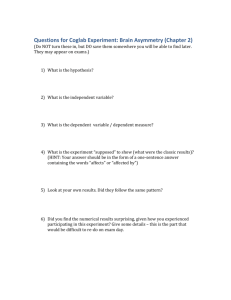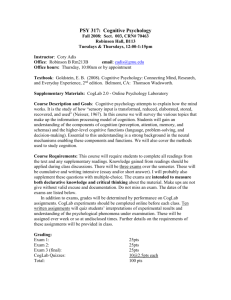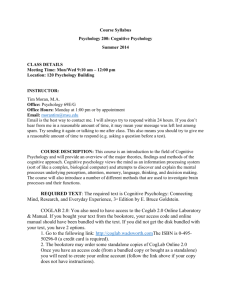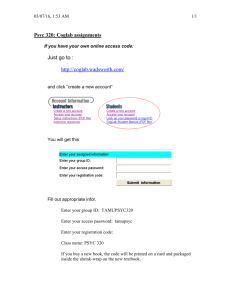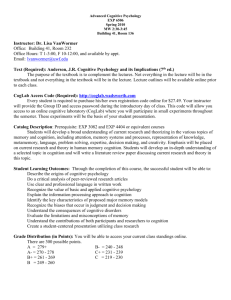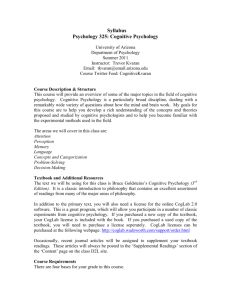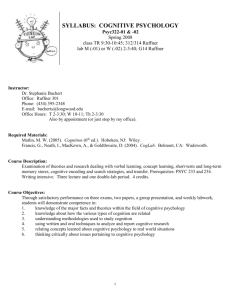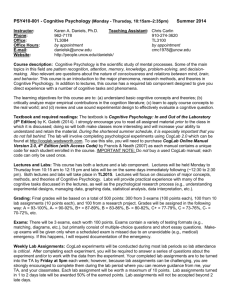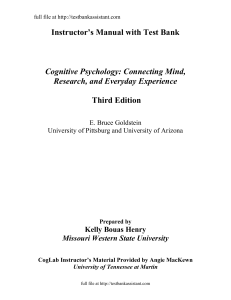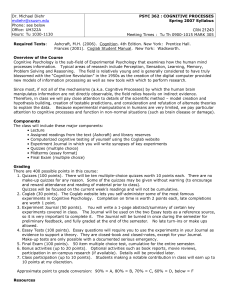Psych 200 Fall 2015 Psychology 200
advertisement
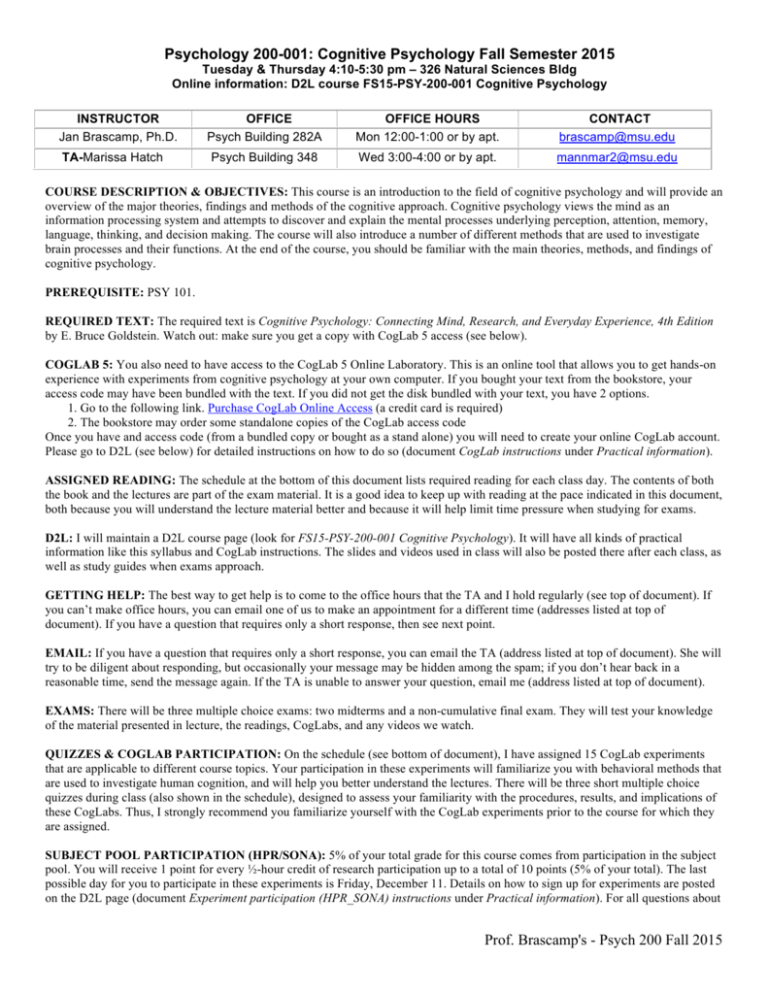
Psychology 200-001: Cognitive Psychology Fall Semester 2015 Tuesday & Thursday 4:10-5:30 pm – 326 Natural Sciences Bldg Online information: D2L course FS15-PSY-200-001 Cognitive Psychology INSTRUCTOR Jan Brascamp, Ph.D. TA-Marissa Hatch OFFICE Psych Building 282A OFFICE HOURS Mon 12:00-1:00 or by apt. CONTACT brascamp@msu.edu Psych Building 348 Wed 3:00-4:00 or by apt. mannmar2@msu.edu COURSE DESCRIPTION & OBJECTIVES: This course is an introduction to the field of cognitive psychology and will provide an overview of the major theories, findings and methods of the cognitive approach. Cognitive psychology views the mind as an information processing system and attempts to discover and explain the mental processes underlying perception, attention, memory, language, thinking, and decision making. The course will also introduce a number of different methods that are used to investigate brain processes and their functions. At the end of the course, you should be familiar with the main theories, methods, and findings of cognitive psychology. PREREQUISITE: PSY 101. REQUIRED TEXT: The required text is Cognitive Psychology: Connecting Mind, Research, and Everyday Experience, 4th Edition by E. Bruce Goldstein. Watch out: make sure you get a copy with CogLab 5 access (see below). COGLAB 5: You also need to have access to the CogLab 5 Online Laboratory. This is an online tool that allows you to get hands-on experience with experiments from cognitive psychology at your own computer. If you bought your text from the bookstore, your access code may have been bundled with the text. If you did not get the disk bundled with your text, you have 2 options. 1. Go to the following link. Purchase CogLab Online Access (a credit card is required) 2. The bookstore may order some standalone copies of the CogLab access code Once you have and access code (from a bundled copy or bought as a stand alone) you will need to create your online CogLab account. Please go to D2L (see below) for detailed instructions on how to do so (document CogLab instructions under Practical information). ASSIGNED READING: The schedule at the bottom of this document lists required reading for each class day. The contents of both the book and the lectures are part of the exam material. It is a good idea to keep up with reading at the pace indicated in this document, both because you will understand the lecture material better and because it will help limit time pressure when studying for exams. D2L: I will maintain a D2L course page (look for FS15-PSY-200-001 Cognitive Psychology). It will have all kinds of practical information like this syllabus and CogLab instructions. The slides and videos used in class will also be posted there after each class, as well as study guides when exams approach. GETTING HELP: The best way to get help is to come to the office hours that the TA and I hold regularly (see top of document). If you can’t make office hours, you can email one of us to make an appointment for a different time (addresses listed at top of document). If you have a question that requires only a short response, then see next point. EMAIL: If you have a question that requires only a short response, you can email the TA (address listed at top of document). She will try to be diligent about responding, but occasionally your message may be hidden among the spam; if you don’t hear back in a reasonable time, send the message again. If the TA is unable to answer your question, email me (address listed at top of document). EXAMS: There will be three multiple choice exams: two midterms and a non-cumulative final exam. They will test your knowledge of the material presented in lecture, the readings, CogLabs, and any videos we watch. QUIZZES & COGLAB PARTICIPATION: On the schedule (see bottom of document), I have assigned 15 CogLab experiments that are applicable to different course topics. Your participation in these experiments will familiarize you with behavioral methods that are used to investigate human cognition, and will help you better understand the lectures. There will be three short multiple choice quizzes during class (also shown in the schedule), designed to assess your familiarity with the procedures, results, and implications of these CogLabs. Thus, I strongly recommend you familiarize yourself with the CogLab experiments prior to the course for which they are assigned. SUBJECT POOL PARTICIPATION (HPR/SONA): 5% of your total grade for this course comes from participation in the subject pool. You will receive 1 point for every ½-hour credit of research participation up to a total of 10 points (5% of your total). The last possible day for you to participate in these experiments is Friday, December 11. Details on how to sign up for experiments are posted on the D2L page (document Experiment participation (HPR_SONA) instructions under Practical information). For all questions about Prof. Brascamp's - Psych 200 Fall 2015 research participation, please do not contact me but contact the Research Participation Coordinator, Ms. Leslie Baldwin (lbaldwin@msu.edu). If you are under 18 years old and therefore cannot participate in research, you can perform an alternative assignment. For details on this assignment, please contact Ms. Leslie Baldwin (lbaldwin@msu.edu). If you do not wish to participate for any other reason but would still like to get these points, then you can perform the following alternative assignment. Select 20 of the CogLab experiments that are not among the 15 assigned for the course (i.e. not in the schedule below), complete the experiments, and answer all the associated essay questions in the CogLab student manual (log into CogLab and choose 'View student manual'). Your answers must be in my possession no later than the last lecture day (December 10, 2015), and points will be assigned in proportion to the experiments/questions completed (up to 10 points). MAKE UP EXAMS & QUIZZES: You may take a makeup exam or quiz in case of (1) a documented medical emergency, or (2) a legitimate schedule conflict, such as a religious holiday or sports travel, that you inform the professor about at least 1 week in advance. In either case, please send an email to me identifying the emergency or conflict. In either case, you may take the exam either at another time on the normal exam day, or sometime prior to the next course meeting. If you cannot take the exam on one of those days, then that exam will be omitted from your final score and its points distributed over the other exams. If you miss an exam for any other reason, or don’t notify me in time about your emergency or conflict, your score will be 0. If some other circumstance arises during the term that interferes with your ability to keep up in the course, please be aware that there is little that can be done to change a final grade once the term is over. If such a circumstance arises, please seek advice as soon as possible. ATTENDANCE: You are expected to attend each class. I will present material in a different way than the textbook and I will present material that is not covered by the textbook. CELL PHONES: Please ensure that your cell phone is turned off or on silent mode before class begins. RECORDING LECTURES: Students are expected to respect the intellectual property of course instructors. All course materials presented to students are the copyrighted property of the course instructor and are subject to the following conditions of use: 1. Students may record lectures or any other classroom activities and use the recordings only for their own course-related purposes. 2. Students may not post the recordings or other course materials online or distribute them to anyone not enrolled in the class without the advance written permission of the course instructor and, if applicable, any students whose voice or image is included in the recordings. 3. Any student violating the conditions described above may face academic disciplinary sanctions. ACADEMIC HONESTY: Article 2.III.B.2 of the Student Rights and Responsibilites (SRR) states that "The student shares with the faculty the responsibility for maintaining the integrity of scholarship, grades, and professional standards." In addition, the (insert name of unit offering course) adheres to the policies on academic honesty as specified in General Student Regulations 1.0, Protection of Scholarship and Grades; the all-University Policy on Integrity of Scholarship and Grades; and Ordinance 17.00, Examinations. (See Spartan Life: Student Handbook and Resource Guide and/or the MSU Web site: www.msu.edu.) Therefore, unless authorized by your instructor, you are expected to complete all course assignments, including homework, lab work, quizzes, tests and exams, without assistance from any source. You are expected to develop original work for this course; therefore, you may not submit course work you completed for another course to satisfy the requirements for this course. Also, you are not authorized to use the www.allmsu.com Web site to complete any course work in this course. Students who violate MSU academic integrity rules may receive a penalty grade, including a failing grade on the assignment or in the course. Contact your instructor if you are unsure about the appropriateness of your course work. (See also the Academic Integrity webpage.) ACCOMMODATIONS FOR STUDENTS WITH DISABILITIES: Michigan State University is committed to providing equal opportunity for participation in all programs, services and activities. Requests for accommodations by persons with disabilities may be made by contacting the Resource Center for Persons with Disabilities at 517-884-RCPD or on the web at rcpd.msu.edu. Once your eligibility for an accommodation has been determined, you will be issued a Verified Individual Services Accommodation ("VISA") form. Please present this form to me at the start of the term and/or at least two weeks prior to the accommodation date (test, project, etc.). Requests received after this date may not be honored. DISRUPTIVE BEHAVIOR: Article 2.III.B.4 of the Student Rights and Responsibilities (SRR) for students at Michigan State University states: "The student's behavior in the classroom shall be conducive to the teaching and learning process for all concerned." Article 2.III.B.10 of the SRR states that "The student and the faculty share the responsibility for maintaining professional relationships based on mutual trust and civility." General Student Regulation 5.02 states: "No student shall . . . interfere with the functions and services of the University (for example, but not limited to, classes . . .) such that the function or service is obstructed or disrupted. Students whose conduct adversely affects the learning environment in this classroom may be subject to disciplinary action through the Student Judicial Affairs office. Prof. Brascamp's - Psych 200 Fall 2015 Final Grade Breakdown # of Total Points % of Final Grade Best Exam Other Exam Other Exam Quiz 1 60 50 50 10 30.0% 25.0% 25.0% 5.0% Quiz 2 Quiz 3 10 10 5.0% 5.0% Subject Pool COURSE TOTAL 10 5.0% 200 points 100% Final Grade Scale* 91% and above 87%-90% 81%-86% 77%-80% 71%-76% 67%-70% 61%-66% Less than 61% 4.0 3.5 3.0 2.5 2.0 1.5 1.0 0.0 * I reserve the right to make the grading scale more lenient if needed. Course schedule This schedule is tentative. I reserve the right to change it to best suit the course DATE TOPIC READING COGLAB 9/3 Introduction to the course 9/8 9/10 9/15 9/17 History of cognitive psychology 1 History of cognitive psychology 2 Cognitive neuroscience 1 Cognitive neuroscience 2 Ch 1 Ch 1 Ch 2 Ch 2 1. Signal detection 2. Simple detection 22. Sternberg search 6. Müller-Lyer illusion 9/22 9/24 Methods 1 CogLabs quiz 1 + Methods 2 Ch 2 Ch 2 7. Visual search 9/29 10/1 Catch up & Review Midterm 1 10/6 10/8 10/13 10/15 10/20 10/22 10/27 10/29 11/3 11/5 11/10 11/12 11/17 11/19 11/24 11/26 12/1 12/3 Perception 1 Perception 2 Attention 1 Attention 2 No class (Neuroscience conference) CogLabs quiz 2 + Memory 1 Memory 2 Memory 3 Catch up & Review Midterm 2 Conceptual knowledge Imagery 1 CogLabs quiz 3 + Imagery 2 Language Problem solving 1 Holiday. University closed Problem solving 2 Judgment, decisions and reasoning 1 Ch 3 Ch 3 Ch 4 Ch 4 Ch 5 Ch 6 Ch 7 Ch 8 14. Blind spot 3. Apparent motion 9. Change detection 12. Spatial cueing 13. Stroop effect Ch 9 Ch 10 Ch 10 Ch 11 Ch 12 31. Serial position 47. Prototypes 12/8 12/10 Judgment, decisions and reasoning 2 Catch up & Review 18. Partial report 24. Memory span 28. Encoding specificity Ch 12 Ch 13 Ch 13 ==== NON-CUMULATIVE FINAL EXAM: Monday December 14 5:45-7:45 p.m.==== Prof. Brascamp's - Psych 200 Fall 2015
